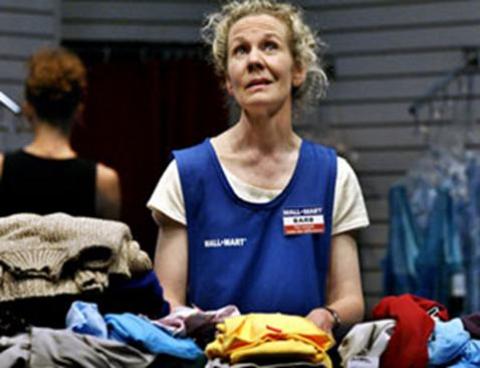
Johnnie Torres as Hector, Veronica Alicino as Joan, Zachary Barton as Barbara, Kathleen Ingle as Gail, Jackie Joniec as woman customer, Carmen Lezeth Suarez as Phyllis. (Photos by Olivier Riquelme)
“Ye are the salt of the earth: but if the salt have lost his savour, wherewith shall it be salted? It is thenceforth good for nothing, but to be cast out, and to be trodden under foot of men.
Ye are the light of the world.”
– Jesus Christ, anti-colonial rebel, to the multitudes in the Sermon on the Mount
Since the collapse of capitalism in 2008 there has been a rebirth of left-leaning theatre, and Nickel and Dimed is one of this dissident theatrical wave’s finest, most compelling dramas.
There’s a hallowed tradition of truth tellers going undercover and/or inflicting harrowing experiences upon themselves in order to then expose great evils to the world at large. As skilled mass communicators they can give a platform to the voiceless or at least express a point of view coming from an authoritative, authentic firsthand perspective on the wrongs they are revealing. Examples of this include 1933’s Down and Out in Paris and London, wherein George Orwell wrote about his experiences as a dishwasher and as a street busker and hobo in Britain during the Great Depression.
 Kathleen Ingle as Gail, Zachary Barton as Barbara, Veronica Alicino as teenager, Jackie Joniec as woman customer, Matthew Wrather as man
Kathleen Ingle as Gail, Zachary Barton as Barbara, Veronica Alicino as teenager, Jackie Joniec as woman customer, Matthew Wrather as man
In the 1961 Civil Rights classic Black Like Me, John Howard Griffin, a Caucasian journalist darkened his skin in order to experience the segregated South from a Black perspective (in 1964 James Whitemore and Will Geer co-starred in a low-budget feature film version of the book which took its title from a Langston Hughes poem). In the 2004 documentary Morgan Spurlock subjected himself to a diet of McDonald’s for a month, disclosing the dangers of fast food consumption in Super Size Me.
Barbara Ehrenreich’s 2001 Nickel and Dimed: On (Not) Getting By In America is in this muckraking genre’s tradition. The expose is also a 21st century counterpart to Frederick Engels’ 1845 The Condition of the Working Class in England. Nickel grew out of an article for Harper’s magazine wherein the accomplished author clandestinely worked for three months in a number of blue collar low-wage jobs to see if one could survive doing so. Former San Francisco Mime Troupe playwright Joan Holden’s adaptation, Nickel and Dimed, is a superb, moving dramatization based on the then-50-something Ehrenreich’s undercover misadventures in minimum wage-land.
Zachary Barton is stellar as the protagonist who is alternately called “Barbara” — when she’s in authorial mode — and “Barb” when she is waitressing at the “Kenny’s” eatery chain, folding and sorting clothes at “Mallmart”, cleaning homes for “Magic Maids” and so on. Barton expertly expresses Barbara/Barb’s smoldering outrage. The veteran stage actress’ visage actually bears a resemblance to Ehrenreich’s face, and she is simply splendid and outstanding as the writer who proudly proclaims early in the play: “I’m a radical.” Later on a character ponders about Barb: “I wonder if she’s a communist?”
 Veronica Alicino, Carmen Lezeth Suarez, Zachary Barton as Barbara, Johnnie Torres, Jackie Joniec.
Veronica Alicino, Carmen Lezeth Suarez, Zachary Barton as Barbara, Johnnie Torres, Jackie Joniec.
(I don’t know if the author is a Marxist per se of any stripe, but at the website of Democratic Socialists of America Ehrenreich is listed as an “Honorary Chair” and quoted as saying: “DSA carries on a fine old American tradition— the tradition carried on by Eugene Debs, Mother Jones, Elizabeth Cady Stanton, and thousands more. I am proud to be a member.” )
Meanwhile, back at the theatre:
The ensemble cast is likewise first-class as (mostly) working class stiffs Barb encounters when she goes through the plebian looking glass. From restaurant to big box store employees, fast order cooks to cashiers, Veronica Alicino, Kathleen Ingle, Jackie Joniec, Carmen Lezeth Suarez, Johnnie Torres and Matthew Wrather all play multiple roles, and do so convincingly, with pathos and humor. These thesps are cannily cast, as they don’t, in general, have that glossy Hollywood pretty boy/girl look, but rather appear to be “real people” in various sizes, ethnicities, shapes and ages.
A standout moment in the play is when Wrather as a Mallmart manager seems to ad lib with audience members as he rationalizes the chain’s hyper-exploitation business model, which allegedly includes forcing laborers to work extra hours for no additional payment. (A bit about how the “MallMart” family members are among the richest individuals in America would enhance the dialogue.)
Kudos to Richard Kilroy, who adeptly directs the ensemble and also, tellingly, has the set design credit. This is crucial because Nickel and Dimed has many scenic transitions as we move from one of the peripatetic Barb’s places of employment to another, from Florida to the Northeast. The rapid set changes keep pace with Barb’s odyssey.
The oppressive, humiliating conditions of underpaid, non-unionized, hyper-exploited workers who are low paid and generally don’t receive benefits is first and foremost in the drama. But the rift between intellectuals and manual laborers is also explored — the highly educated Barbara has options her blue collar comrades don’t. Spunky Barb is puzzled by what seems to be their subservience, as the least of those among us may have little, but much to lose if they get fired from their low paying jobs. Without much of (if any) a safety net, this wage slavery is all that stands between them and sheer, utter destitution.
 Zachary Barton as Barbara, Carmen Lezeth Suarez as Maddy.
Zachary Barton as Barbara, Carmen Lezeth Suarez as Maddy.
Although Barbara may be an intellectual and author, the compassionate writer and Montana-born daughter of a copper miner remembers her own humble origins (Ehrenreich was also married to a Teamster organizer for 10 years), and yearns and burns to shine a light on their proletarian plight. Barbara’s crusade causes a fissure to grow between her and her white collar boyfriend (one of the many parts Wrather plays), but [PLOT SPOILER ALERT!] Holden’s script fails to resolve this plot-wise and to fully show how Barbara’s underground escapades among the wretched of the Earth have changed her.
But this is a mere quibble. Nickel and Dimed powerfully, poignantly demonstrates why the millions of unrepresented workers need to be unionized, and how this is arguably the cause of our time. (During the last Depression the unionization rate grew by 300%, and Ehrenreich founded and has been the president of United Professionals, a membership organization for white collar workers.) All those who argue against raising the minimum wage should be forced to live on it themselves. By the end of this do-not-miss play you may feel like singing “The Internationale” — or the Rolling Stones’ anthem:
“Let’s drink to the hard working people
Let’s think of the lowly of birth
Spare a thought for the rag taggy people
Let’s drink to the salt of the earth.”
Bright Eyes Productions’ Nickel and Dimed is being performed on Fridays and Saturdays at 8:00 p.m. and Sundays at 3:00 p.m. through August 25 at the Hudson Mainstage Theatre, 6539 Santa Monica Blvd., Los Angeles, CA 90038. For tickets: Call (323)960-5770 .


Spread the word